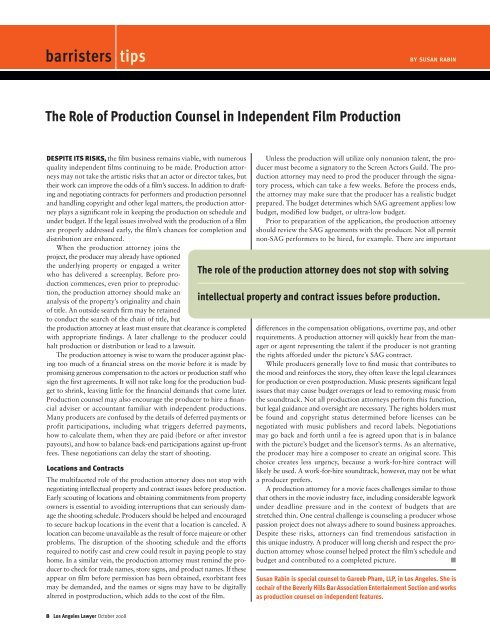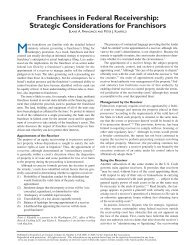Los Angeles Lawyer October 2008 - Gray Plant Mooty
Los Angeles Lawyer October 2008 - Gray Plant Mooty
Los Angeles Lawyer October 2008 - Gray Plant Mooty
Create successful ePaper yourself
Turn your PDF publications into a flip-book with our unique Google optimized e-Paper software.
arristers tips<br />
BY SUSAN RABIN<br />
The Role of Production Counsel in Independent Film Production<br />
DESPITE ITS RISKS, the film business remains viable, with numerous<br />
quality independent films continuing to be made. Production attorneys<br />
may not take the artistic risks that an actor or director takes, but<br />
their work can improve the odds of a film’s success. In addition to drafting<br />
and negotiating contracts for performers and production personnel<br />
and handling copyright and other legal matters, the production attorney<br />
plays a significant role in keeping the production on schedule and<br />
under budget. If the legal issues involved with the production of a film<br />
are properly addressed early, the film’s chances for completion and<br />
distribution are enhanced.<br />
When the production attorney joins the<br />
project, the producer may already have optioned<br />
the underlying property or engaged a writer<br />
who has delivered a screenplay. Before production<br />
commences, even prior to preproduction,<br />
the production attorney should make an<br />
analysis of the property’s originality and chain<br />
of title. An outside search firm may be retained<br />
to conduct the search of the chain of title, but<br />
the production attorney at least must ensure that clearance is completed<br />
with appropriate findings. A later challenge to the producer could<br />
halt production or distribution or lead to a lawsuit.<br />
The production attorney is wise to warn the producer against placing<br />
too much of a financial stress on the movie before it is made by<br />
promising generous compensation to the actors or production staff who<br />
sign the first agreements. It will not take long for the production budget<br />
to shrink, leaving little for the financial demands that come later.<br />
Production counsel may also encourage the producer to hire a financial<br />
adviser or accountant familiar with independent productions.<br />
Many producers are confused by the details of deferred payments or<br />
profit participations, including what triggers deferred payments,<br />
how to calculate them, when they are paid (before or after investor<br />
payouts), and how to balance back-end participations against up-front<br />
fees. These negotiations can delay the start of shooting.<br />
Locations and Contracts<br />
The multifaceted role of the production attorney does not stop with<br />
negotiating intellectual property and contract issues before production.<br />
Early scouting of locations and obtaining commitments from property<br />
owners is essential to avoiding interruptions that can seriously damage<br />
the shooting schedule. Producers should be helped and encouraged<br />
to secure backup locations in the event that a location is canceled. A<br />
location can become unavailable as the result of force majeure or other<br />
problems. The disruption of the shooting schedule and the efforts<br />
required to notify cast and crew could result in paying people to stay<br />
home. In a similar vein, the production attorney must remind the producer<br />
to check for trade names, store signs, and product names. If these<br />
appear on film before permission has been obtained, exorbitant fees<br />
may be demanded, and the names or signs may have to be digitally<br />
altered in postproduction, which adds to the cost of the film.<br />
Unless the production will utilize only nonunion talent, the producer<br />
must become a signatory to the Screen Actors Guild. The production<br />
attorney may need to prod the producer through the signatory<br />
process, which can take a few weeks. Before the process ends,<br />
the attorney may make sure that the producer has a realistic budget<br />
prepared. The budget determines which SAG agreement applies: low<br />
budget, modified low budget, or ultra-low budget.<br />
Prior to preparation of the application, the production attorney<br />
should review the SAG agreements with the producer. Not all permit<br />
non-SAG performers to be hired, for example. There are important<br />
The role of the production attorney does not stop with solving<br />
intellectual property and contract issues before production.<br />
differences in the compensation obligations, overtime pay, and other<br />
requirements. A production attorney will quickly hear from the manager<br />
or agent representing the talent if the producer is not granting<br />
the rights afforded under the picture’s SAG contract.<br />
While producers generally love to find music that contributes to<br />
the mood and reinforces the story, they often leave the legal clearances<br />
for production or even postproduction. Music presents significant legal<br />
issues that may cause budget overages or lead to removing music from<br />
the soundtrack. Not all production attorneys perform this function,<br />
but legal guidance and oversight are necessary. The rights holders must<br />
be found and copyright status determined before licenses can be<br />
negotiated with music publishers and record labels. Negotiations<br />
may go back and forth until a fee is agreed upon that is in balance<br />
with the picture’s budget and the licensor’s terms. As an alternative,<br />
the producer may hire a composer to create an original score. This<br />
choice creates less urgency, because a work-for-hire contract will<br />
likely be used. A work-for-hire soundtrack, however, may not be what<br />
a producer prefers.<br />
A production attorney for a movie faces challenges similar to those<br />
that others in the movie industry face, including considerable legwork<br />
under deadline pressure and in the context of budgets that are<br />
stretched thin. One central challenge is counseling a producer whose<br />
passion project does not always adhere to sound business approaches.<br />
Despite these risks, attorneys can find tremendous satisfaction in<br />
this unique industry. A producer will long cherish and respect the production<br />
attorney whose counsel helped protect the film’s schedule and<br />
budget and contributed to a completed picture.<br />
■<br />
Susan Rabin is special counsel to Gareeb Pham, LLP, in <strong>Los</strong> <strong>Angeles</strong>. She is<br />
cochair of the Beverly Hills Bar Association Entertainment Section and works<br />
as production counsel on independent features.<br />
8 <strong>Los</strong> <strong>Angeles</strong> <strong>Lawyer</strong> <strong>October</strong> <strong>2008</strong>







